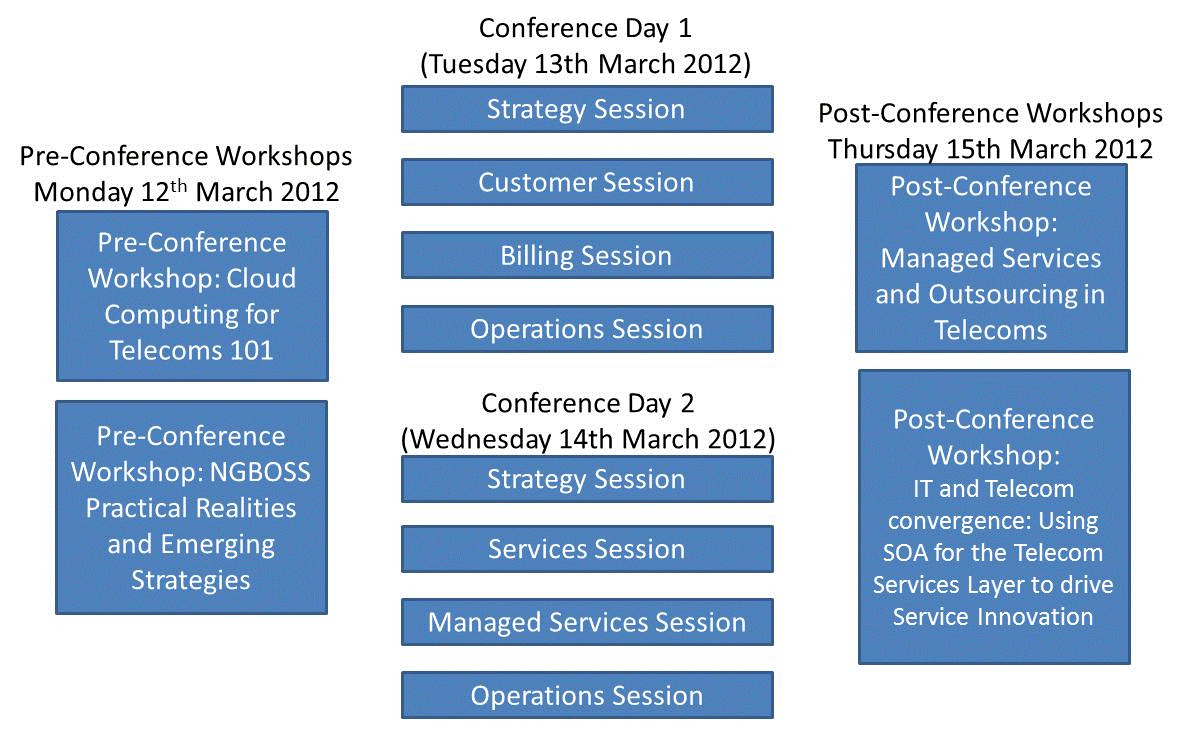I will not be involved in this conference for the reasons set out in this weblog article.
I’ve been asked to chair the African Service Provider IT (AspIT) Conference and Exhibition in March of 2012. Its looks like its going to be a unique and interesting conference. Its definitely reflecting the frustrations and issues I’m seeing many operators raise whenever business and operational support systems are discussed, and taking it from an African perspective, which given their unique situation has the potential to leapfrog western operators’ mistakes.
The telecommunications industry continues to struggle with its IT (Information Technology) spend. For example, traditional operators’ IT spend is 10 times that of new entrants on a per subscriber basis, and most of that spend is on legacy systems. Compared to industry averages, operators spend 9% of revenue on IT compared to an industry average of 4%; 70% of that spend is on legacy systems, and 75% is on custom systems rather than COTS (Commercial Off The Shelf). Are operators’ business processes so different they require custom systems? Are customers even aware of such differentiation? Can Africa afford to copy the mistakes made in western markets?
Managed services and outsourcing are driven primarily through the convergence of IT, Media, Telecoms and Enterprise. Telecom equipment vendors are following IT solution companies (e.g. IBM and HP) that migrated from the equipment manufacturing business model to focus on IT services and consulting initially for the Enterprise, then latterly for Telecom BOSS (Business and Operational Support Systems). Even though the shift by most telecom suppliers is about eight years behind the IT companies, the change provides strong growth opportunities thanks to the savings passed through to operators.
The complexities of running both fixed and mobile networks and value added services continues to increase, while operators are required to focus their scarce resources given a highly competitive market. To maintain margin growth operations have focused on cost-cutting exercises which has accelerated outsourcing. Operator’s acceptance of partnering and acquisition of external expertise has grown in recognition of the opportunities and efficiencies such activities provide. Managed services has emerged as an important delivery model for network equipment vendors, systems integrators, BOSS specialists, applications and service specialist as well as network-owning operators themselves.
Given the relative slow adoption of managed services in telecoms, cloud computing has rapidly entered the telecoms industry. Both as a technology for service delivery, for example with hosted unified communication services. As well as a technology to support managed and hosted BOSS at attractive price points. Africa with its surfeit of high speed submarine cables and diminishing infrastructure gap thanks to mobile broadband networks is poised to adopt cloud computing as fast as any region, what does this mean to Service Provider IT and the services it supports? How will Cloud Computing and Managed Services work together in Africa? Has an inflexion point been reached where Africa can leapfrog other regions in solving the service provider IT conundrum?
From a technology perspective we’re witnessing the ‘ITization’ of Telecoms, not a merger: IP was an enterprise technology (when it achieved scale) that is now the core of telecoms, not ATM (Asynchronous Transfer Mode); SOA (Service Oriented Architecture) is an IT workflow bus that is now the core of an operators’ service delivery and business operations. Similarly, will TMF (Tele Management Forum) be replaced with ITIL because enterprises (the operator’s customers) use ITIL not TMF. Have we reached a point where service provider IT is about to shift to an enterprise model?
Why be involved in the AspIT (African Service Provider IT) Conference?
- Built in Africa for Africa, Vital Training, an African business, put AspIT together, they’re living and breathing the region’s issues every day;
- Built by the industry for the industry, the people involved in bringing the conference together each have 20+ years of industry experience; and
- Covering the whole SPIT ecosystem, from customer relationship management and service innovation through to network management and sharing, from cloud services, through managed services to the nitty-gritty of systems integration.
Conference Objectives
- Investigate and understand extensive case studies throughout the conference on operator experiences in deploying Service Provider IT in Africa, as well as relevant international learning.
- Review what Africa can learn from the web service providers and their back office systems which support hundreds of millions of customers, can their experiences help African operators leap-frog western operators?
- Explore the African ‘lay of the land’ to better quantify the impact cloud computing, mobile broadband, market diversity, and managed services will have on service provider IT in the region.
- Focus on Africa’s issues:
- Prepaid dominance
- Managing Growth
- Cost / margin focus
- Market Diversity: across network, customers, ARPU, needs
- Regulation: universal service obligations
- Submarine cable around Africa is enabling cloud innovations for service providers
- Mobile broadband is closing the infrastructure gap
- Cloud and Managed Services are closing the skills gap
- Proven unique innovations such as mobile banking, mobile health and mobile education are achieving success in Africa
- Target Attendees
- Service providers and their suppliers – network equipment providers, software / IT solution vendors, system integrators, managed service providers, cloud providers, etc.
- CEO, CTO, CIO, CSO (Chief Strategy Officer) and their VP and director reports.
- But also as critically CMO (Chief Marketing Officer) and COO (Chief Operating Officer) and their Marketing and Customer Service executives.
The picture below shows the structure of the conference with pre and post conference workshops on a number of relevant topics such as cloud computing, managed services, next generation business and operational support systems and SOA (Service Oriented Architecture). I hope to see you there as it looks like its going to be an intense, unique and practical implementation-focused conference.
I will not be involved in this conference for the reasons set out in this weblog article.
